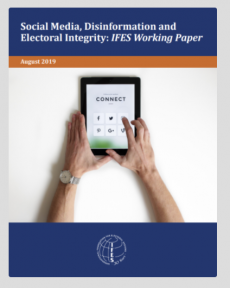
In recent years, the prevalence of disinformation, particularly through social media, and its threat to the integrity of elections have become an issue of global concern. While this space is rapidly changing and developing, a better definition of problems and terms, and a deeper understanding of the challenge that social media disinformation poses to electoral integrity are needed.
A new International Foundation for Electoral Systems (IFES) working paper on Social Media, Disinformation and Electoral Integrity examines this challenge and seeks to answer important questions. Is social media fundamentally different from traditional media and in what way? Does the state have a role in regulating this sector, and if so, what level of regulation is appropriate to ensure respect for fundamental freedoms? How can citizens be better informed to ensure that they are making choices based on accurate information and facts, rather than disinformation, hate speech and other types of divisive influence campaigns as there is a conceptual link between these two different but often interrelated phenomena of disinformation and hate speech?
The paper offers responses election management bodies and international nongovernmental organizations can take to attempt to mitigate the negative consequences, presenting the latest innovative thinking, solutions and tools being applied by IFES and other key organizations and the recent developments in this field.
Published by International Foundation for Electoral Systems (IFES).
